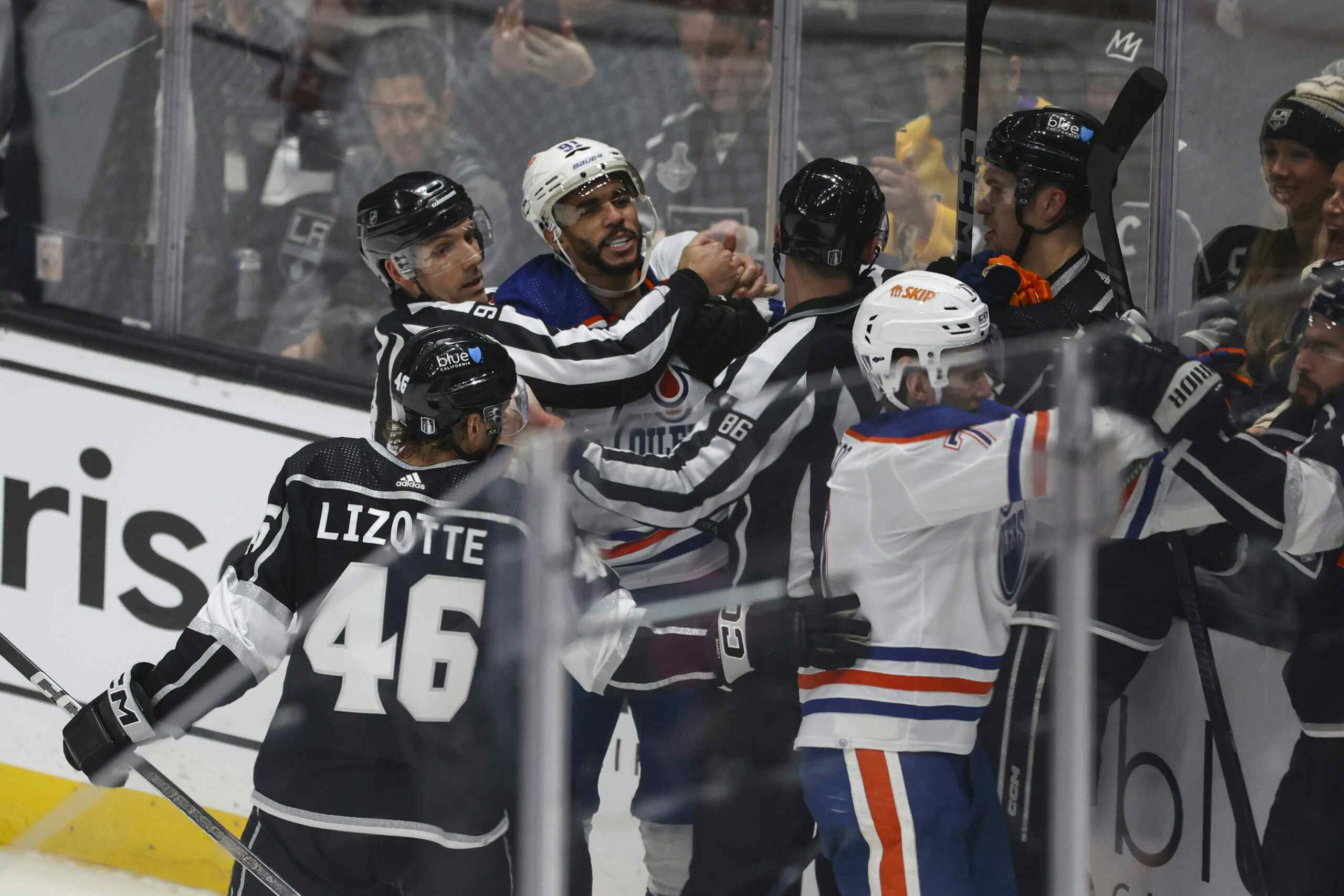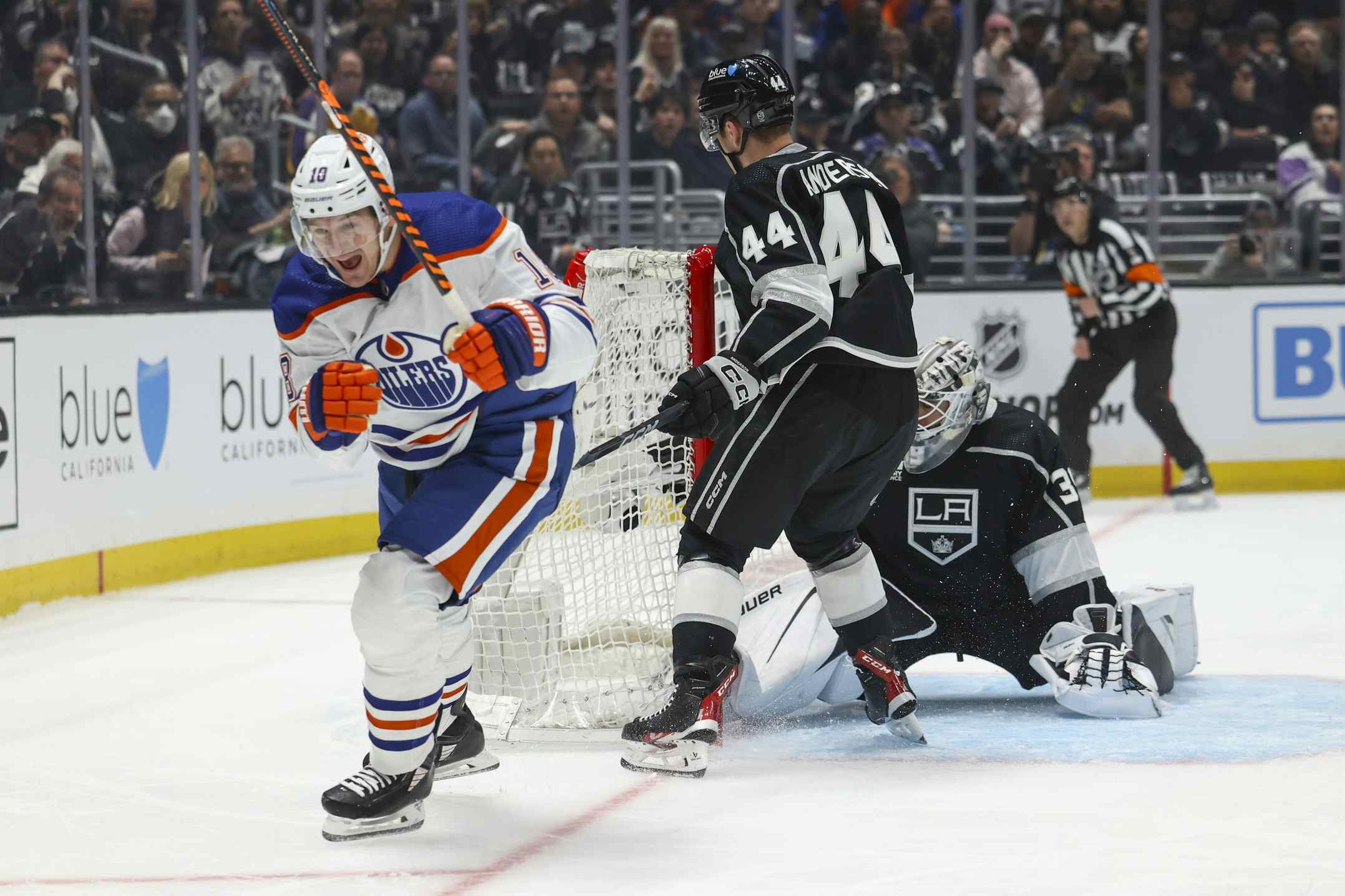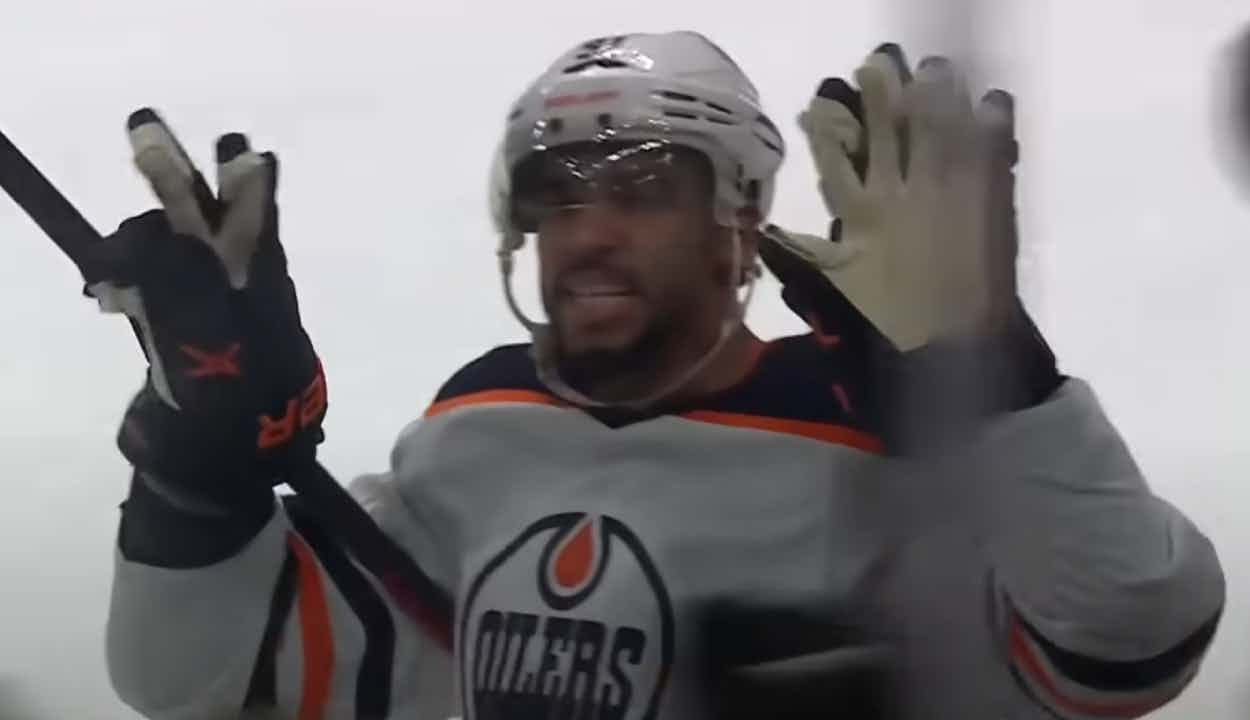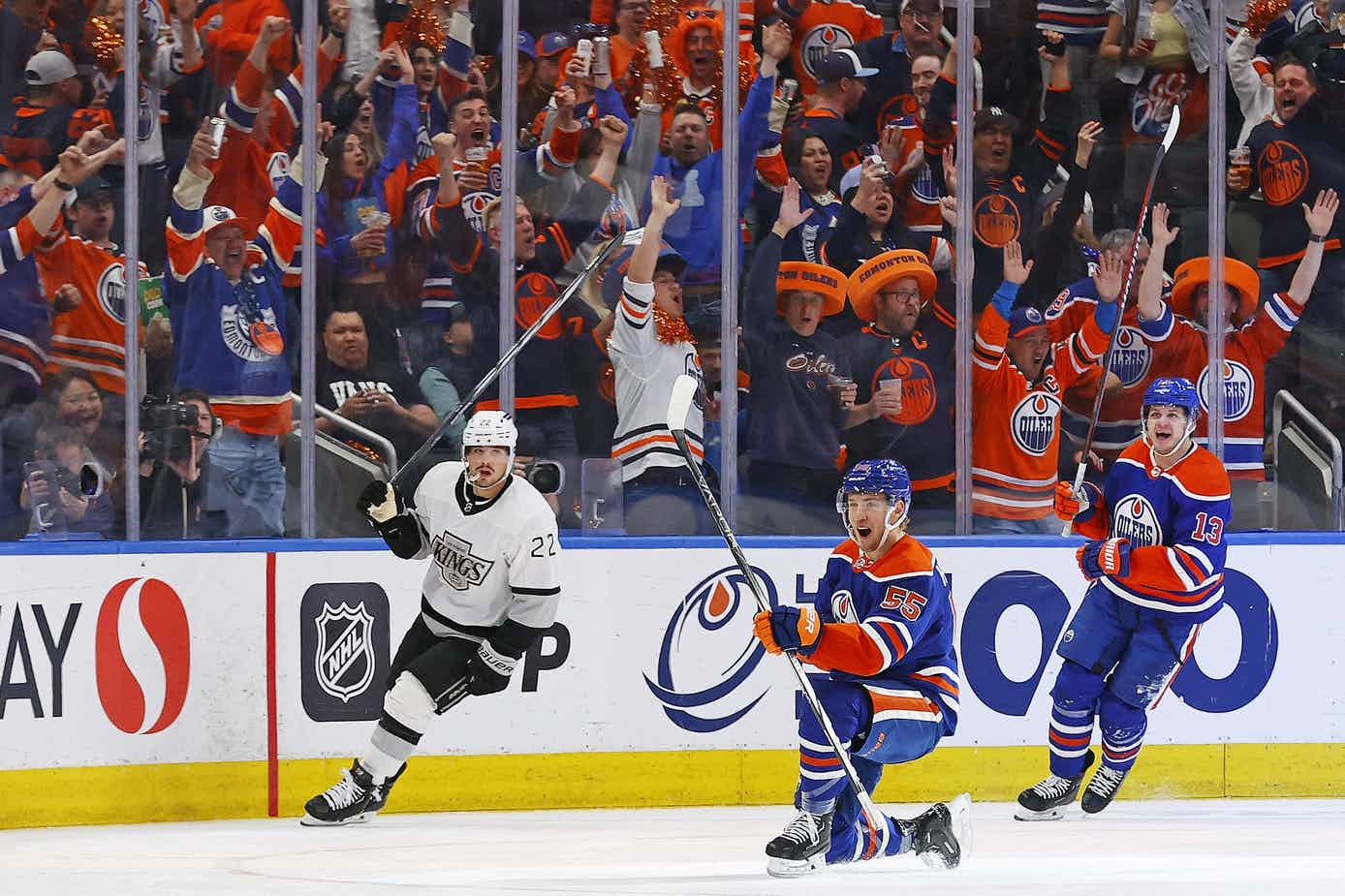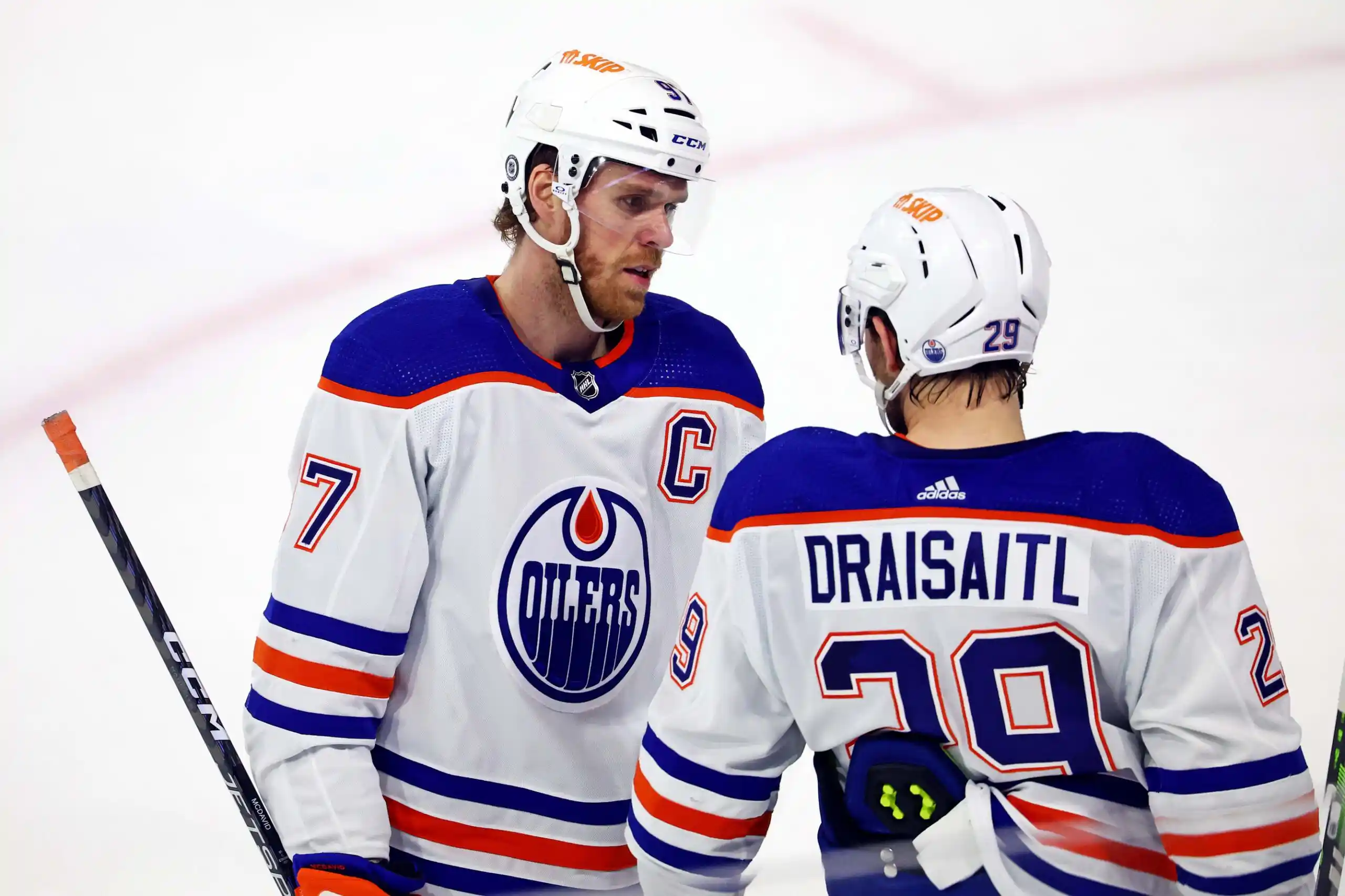TAMBELLINI TALKS TRADE AND MORE
By Jason Gregor
11 years ago
Yesterday the Oilers made a minor trade acquiring rugged winger Mike Brown from the Toronto Maple Leafs for a 2014 fourth round pick that will become a 2014 third rounder if the Oilers make the playoffs.
I spoke with Oilers general manager Steve Tambellini on my radio show yesterday about that move, but I also got his thoughts on the competitive nature of his team, Taylor Hall moving to centre, Justin Schultz and what is the culture of the Edmonton Oilers.
Gregor: There were rumors and my source that said you put in a waiver request for Aaron Volpatti last week, but obviously Washington claimed him first. Is that true? Have you been looking to add somebody with a little more grit, toughness to your lineup for awhile?
Gregor: There were rumors and my source that said you put in a waiver request for Aaron Volpatti last week, but obviously Washington claimed him first. Is that true? Have you been looking to add somebody with a little more grit, toughness to your lineup for awhile?
Tambellini: Ya, well first of all I’m not going to comment on Volpatti, he’s not our property. We normally don’t relay that information. With regards to Mike, yes, we’ve been looking for a player that obviously can bring that level of compete. People know his toughness. He’s a very willing combatant that sticks up for his team mates. He has very good speed, we like that part of it. When Ralph needs to ramp up our forecheck and needs the first forward to take some bodies, he’s able to do that. He also has, throughout his career, killed penalties. That just gives the option to Ralph to find different types of minutes for him. In the season, Jason, such a condensed season, managing energy is a very, very important aspect of managing your bench. If you have players that are only there for one specific reason, there are some games where you can get caught because you’re basically playing with ten or eleven forwards and that’s something we don’t want to do.
Gregor: Brown has essentially been a fourth line guy, I think he averaged eight or nine minutes last year in Toronto. It’s a lot harder to find a guy who can play that role at fifteen minutes. Is there any chance that Brown will get more of an opportunity to play more minutes in Edmonton? Or is he seen as a fourth line player only?
Tambellini: We’ll see. You never know. Historically, Mike has been in that spot where he’s played around ten minutes a night and good, good competitive, tough minutes. Like I said, it is nice to be able to see a guy like that be able to contribute to part of your penalty kill rotation. We’ll see where it goes, but we know what Mike delivers and he knows what he brings. I talked to him this morning and he’s really excited about coming to play with our club. He said he’s ready to do what he needs to do to be a part of the leadership group here to help this team go forward.
Gregor: Last week Tim Sestito was on waivers. You obviously elected not to put in a claim because Vancouver claimed after you. Today you gave up a draft pick. Do you think Brown’s a better overall player than Sestito?
Tambellini: We were looking for a player that could give us different looks and someone that’s competitive and someone that could kill penalties. Someone that we know is- he’s extremely fit. He’s got impeccable work habits off the ice and he’s fitting into our culture. We’re looking for someone like that. We’ve asked Toronto a couple times over the last year or so if they’d be interested in something like that and I totally understand why they didn’t want to let him go at that point. But they have some depth there right now and this gave us the opportunity to acquire something like that. It’s hard to find the people that can bring what they do best ever night and he seems to be able to do that.

Gregor: We’re almost at the halfway point. Your team’s been competitive most nights but 5-on-5 scoring has been a huge problem. How do you remain patient when you’re nearing the halfway point of the season and it is still not really rectifying itself? Is a major shake-up something you’ve talked about at all? Or do have to remain patient?
Tambellini: Well major shake-up? What are you suggesting?
Gregor: Have you looked at a trade? If you look at all the type of players you have in your top-nine they are essentially the same. If you could have a Mike Brown with the skill set of a legitimate top nine guy, would you look at adding that type of player?
Tambellini: If those types of players become available, I’m sure they’ll be of great value. If you can find the toughness and the ability to play in your top nine or top six great, but there are not a lot of those people around. But as far as scoring, the skill set of our core that makes up our top six right now, they’re young players that are extremely talented- we know that. There’s no hesitation of thought of them not being great players as they develop, but it’s hard. The league is hard to score in, you’ve got to go to hard areas every night and sometimes fatigue is an issue and sometimes it is just good players playing against other good players, trying to stop you. So it’s difficult.
But we know that eventually, Ryan and Jordan and them, they’ll get their goals, they’ll get their assists. We know that. We’re just trying to make sure that we work as hard as possible as a coaching staff and the way we use them, just to make sure that we can put them in the right spots, where they can take advantage of their skill. So there’s only so much as far as the level of top six people that maybe are available through a trade deadline like that, but those players are normally few and far between.
Gregor: Have you seen a difference in Sam Gagner’s game that makes you believes this will be the year he takes that his good start of twenty games up to thirty, forty, and maybe a full season, as far as being consistent?
Tambellini: I sure hope so. That was one of the things that we talked about with Sam, is that consistency. We spoke earlier of Mike Brown and what he does best is compete. But it’s hard to do that every night and it is hard to be – if you’re playing in our top six to deliver that every night. But that’s what the great players in the NHL do, more than not. They can bring it. I think Sam is maturing nicely. He’s had a real good start to the season. I like the way he’s competed on most nights and I think he’s headed in the right direction. I’m hoping that he can be that guy this year. We need both groups contributing.
Gregor: Taylor Hall admitted that if he was ever going to try centre, he’d want to do it from the start of the season. Have you guys ever had any serious conversations about a trying him there from the start of training camp and into the pre-season with Hall?
Tambellini: We’ve talked about that for sure. We actually talked about it, Jason, in Oklahoma City during the lockout and brought the idea up. He was just coming off of rehabbing his shoulder – six months of rehab- and he really just wanted to get back into a spot where he was comfortable and getting his timing and feeling all the things like that. And that was totally understandable from the coaches and management.
I think down the line, as Taylor gets more experience and time and he’s healthy, I can see a time where he’s being used and tried at spots like that because one, he’s been good enough on face-offs at this point and two, he’s an incredible skater so he can cover a lot of ground at ease. He’s learning to be disciplined in his own zone. So I think he’s going to end up being that guy where it doesn’t matter where you play him- you play him left wing, right wing, center- I think he’s going to give you the same game. He could give us a different look at center as we go along, I agree with that.
Gregor: I think it’s a lot harder than it looks to just make that transition. It takes a lot more work and a lot more mental toughness and focus in a game to know all your responsibilities as a center man. It’s not just saying, “Ok Taylor Hall, we’re going to play you at center and this will be easy.”
Tambellini: It’s a total different approach to the game- it really is. It’s so much easier for a center to go to the wing than a winger to go to center. Your responsibilities, especially in your own zone, are one of support and you can never really turn the energy level down when the play is in the defensive zone. You’re normally always the second person in supporting the defenseman that’s chasing the puck. You’re always in position as an outlet pass. 
At times, what’s really frustrating Jason, for your players that are offensive players like a Taylor Hall, is that the want to have chances every shift. They want to score every shift. They want to generate chances. But sometimes, as a center man, you may go for two or three shifts where there’s not one offensive chance because you have to be that person that’s a supportive defenseman, supports the play all over the ice and it may not happen. There are sometimes when a young player may lose patience and say, “I wanna go,” and boom it’s in your net. So it’s a real discipline.
You mentioned Ryan Nugent-Hopkins and I don’t know if I’ve seen a center man that age come in and be, not the top player in the league, but his habits in the defensive zone are impeccable. They really are. I’m not sure who was the most influential person in his life as far as his development as a hockey player, but his understanding of the defensive zone is outstanding.
His offensive instincts and distribution of the puck are just elite. But what he does, what people don’t see, is how he manages- and he’s not even mature, as far as strength yet- how he manages himself in his own zone. It’s really impressive.
His offensive instincts and distribution of the puck are just elite. But what he does, what people don’t see, is how he manages- and he’s not even mature, as far as strength yet- how he manages himself in his own zone. It’s really impressive.
Gregor: I don’t like to make comparisons, but I look back to Pavel Datsyuk as a young player and just how dedicated he was in his defensive zone. Do you see any similarities at all in their games?
I think Ryan; he’s going to have the chance to be viewed upon as one of those players that can do everything. I really believe that. I mean he’s such a young guy. Also I see a similarity in the way they both move the puck, the way they’re both committed to doing things right. There’s not cheat in their game at all. None. At times you wish Ryan would even be a little more selfish when you’re in the offensive situation. But he is a good example of how you wan to play two-hundred foot hockey.

Gregor: You mentioned competitive players. Competitive isn’t just running guys over, it is wanting to get the puck back if you lose it, it is stripping guys of the puck and sometimes it is separating the guy from a puck. When you look, overall, at your team, do you feel you have enough of these guys or are some of them still learning how to be competitive at the NHL level? Have they reached it yet?
Tambellini: No, we haven’t reached that yet. We’ve seen spurts, like energy in the Dallas game, I thought the compete level in the Chicago game was solid. You know this road trip, this is a test. Nine games in seventeen days, whatever the days are, it’s a test. The mature teams can find a lot of ways to bring it every night. It’s not just the offensive players that are looked upon for eighteen to twenty minutes.
All parts of this machine have to be working and contributing. If you have a weak area, you’re not going to win. That compete level is something that separates successful teams and players from average ones. I think and it’s not just the physical part, as you say, it is also the intensity and the attention and the determination that the good teams possess; they’re excited to get the puck back from you too.
Gregor: Give me your assessment of Justin Schultz twenty games into his NHL career.
I mean, he has an elite hockey mind. He’s just so relaxed. I think of the last time here in Columbus, just remembering what he did on a half breakaway and he stripped the puck off the offensive player, turned in one motion, and threw it up to the blue line on the tape. Play over. You don’t see those plays too often, never mind from a first year player. I’m always impressed when I see him. I love that he’s just so relaxed out there. He’s going to play big minutes for a long time in this league.
Gregor: With Mike Brown coming in did you and Ralph Krueger talk about it beforehand. Obviously people look and say, “Well if he comes in, somebody has to come out of the line up.” Did you and Ralph have that discussion first to ensure that the coach feels that the guy you’re going to bring in is somebody that he feels will replace somebody in this current roster?
Tambellini: Well, if you’re not working closely with your head coach, you’re looking for issues to happen quite quickly that are going to be one of dysfunction. So absolutely we think as a group. Our pro scouts and scouts will target areas where we think we need to get improvement and sometimes you can make a trade where it significantly changes your hockey club and that’s usually a bigger deal. Other times, you’ve got five to ten percent of a certain area where you continually try to upgrade. So yes, absolutely, you speak to your coach and we know that eventually when we’re a healthy team- and I hope to see a healthy team here soon- we’ve got to make changes because there are not enough roster spots for the people that are here.
Gregor: You had mentioned early that Brown fits into the culture of your team. Can you define what the culture of the Edmonton Oilers is right now?
It’s healthy, they care a lot, they want to win and they expect to win. They expect to get in the playoffs. They’re not happy when they play a game like last night. So there’s a heck of a lot more accountability in that dressing room than what I’ve seen in the past.
So I’m happy that it’s going in the right direction from that stand point and that’s what we have to build on; a consistency of principles that’s going to make this organization good for a long time.
FINAL THOUGHTS
- The GM agrees that the Oilers have yet to learn what it takes to be succesfull and win in the NHL on a nightly basis. Considering how young the core is that makes sense, but the organization needs to ensure that they learn what it takes over the next few seasons. Otherwise, despite all their skill and talent, they won’t become a legitimate contender.
- The hard questions for Tambellini and Lowe will be recognizing which players are learning what it takes to win and which ones just can’t grasp it. It will be a fine line and difficult balancing act I presume.
- It sounds like Taylor Hall preferred to focus on just playing this year rather than switching to center. I wonder if he will be open to the move next September?
RECENTLY BY JASON GREGOR
Recent articles from Jason Gregor

